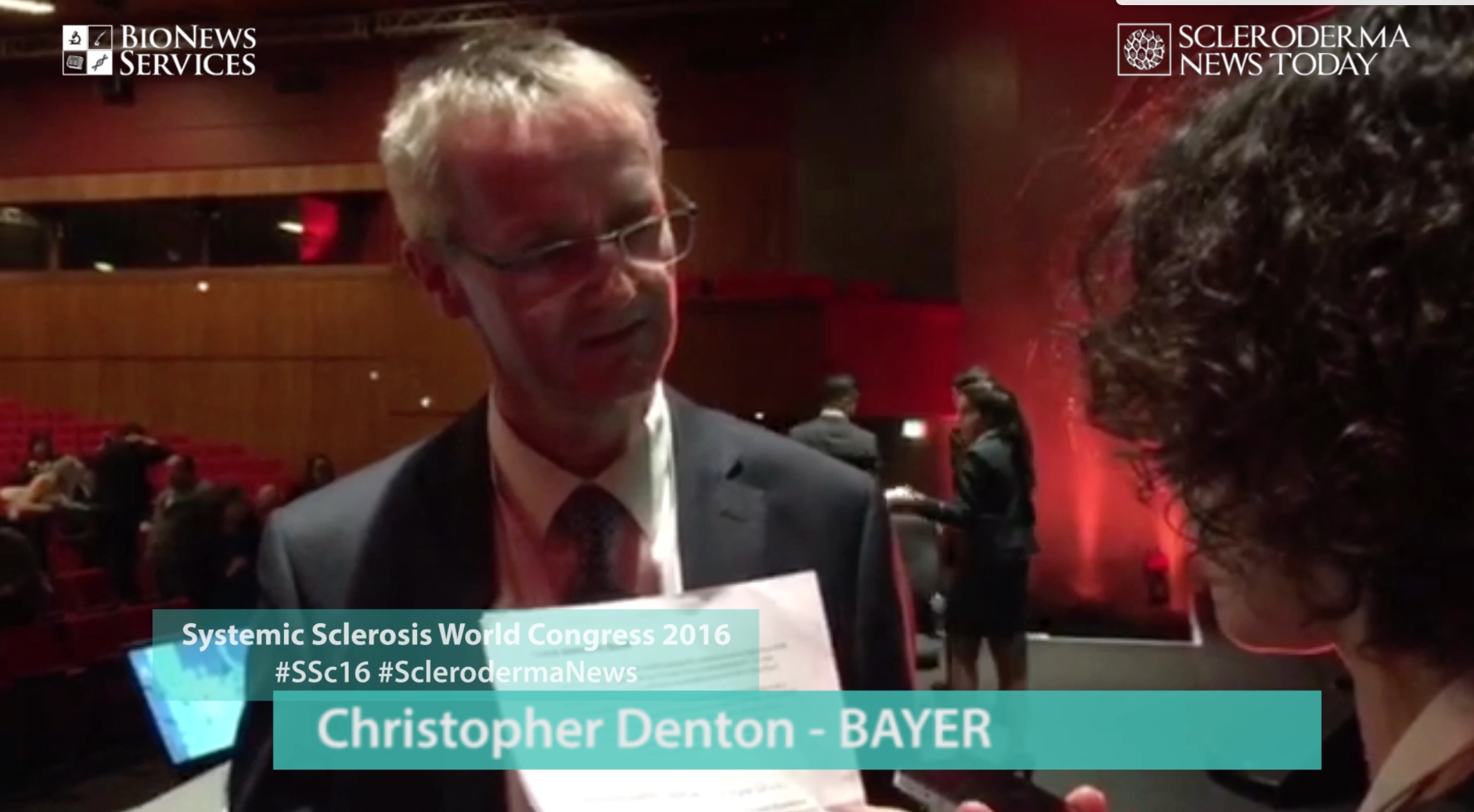Bayer Satellite Symposium at 2016 SSc World Congress: SGC Stimulation and Exclusive Interview with Lead Investigator

Scleroderma News Today’s exclusive interview with Professor Christopher Denton, lead investigator of two Phase 3 clinical trials assessing Bayer’s class of sGC stimulators, Adempas, in PAH and PAH-CTD patients.
The 4th Systemic Sclerosis World Congress opened on Friday with a Satellite Symposium sponsored by Bayer titled “SGC Stimulation — An Innovative Treatment Option in Management of PAH-CTD,” in which researchers working with the company discussed the potential therapy in relation to pulmonary arterial hypertension in systemic sclerosis patients and promising data from two pivotal clinical trials.
The Congress, taking place in Lisbon, Portugal, runs through Saturday, Feb. 20.
Soluble guanylate cyclase (SGC) is a key enzyme of the nitric oxide signaling pathway, and a target attracting increasing interest. Nitric oxide binds to SGC, enhancing the synthesis of cGMP, a molecule involved in the regulation of vascular tone (vasodilation), cell proliferation, fibrosis, and inflammation.
Bayer has developed the first drug of a class of sGC stimulators — riociguat (brand name, Adempas) — that is able to stimulate sGC directly, independently of nitric oxide. Adempas has been approved for the treatment of pulmonary arterial hypertension (PAH) and chronic thromboembolic pulmonary hypertension (CTEPH).
“Pulmonary complications substantially reduce survival in systemic sclerosis patients,” Dr. Jörg Distler noted in his Symposium presentation, and “approximately 10 percent of the patients with systemic sclerosis are affected by PAH.”
Bayer is interested in determining the best combination and therapeutic regimen for Adempas as a treatment option for patients with PAH associated with connective tissue disease (CTD), including systemic sclerosis (SSc).
In his talk, “sGC stimulation: Understanding the mode of action,” Dr. Distler said that the development of pulmonary hypertension is linked to a series of devastating effects in the pulmonary vasculature that are based on cell proliferation, fibrosis, inflammation, and vasoconstriction. Interestingly, preclinical data in fibrotic disease models revealed that Adempas was able to reduce and/or prevent skin fibrosis and collagen production.
Dr. Dinesh Khanna also participated and discussed PAH screening and diagnosis in SSc patients, emphasizing that “PAH is a leading cause of mortality in SSc,” and “early screening and detection appear to improve outcomes including survival” in this patient population.
Professor Christopher Denton presented data on Phase 3 clinical trials evaluating Adempas in a presentation titled “sGC stimulation in PAH-CTD patients: Results from the PATENT studies.”
The PATENT-1 study (NCT00810693) was a 12-week, Phase 3 clinical trial assessing Adempas (1.5 and 2.5 mg), compared to a placebo, in 405 PAH patients, of whom 25 percent had PAH-CTD. PATENT-2 (NCT00863681) is an ongoing Phase 3 extension trial of PATENT-1.
Professor Denton, the trials’ lead investigator, said PATENT-1 showed that “Adempas improved 6MWD [6 minute walk distance, a measure of exercise capacity] and several secondary endpoints in PAH-CTD patients,” including pulmonary vascular resistance. Adempas was well-tolerated, and at “week 12, more patients in the placebo group had missing values due to withdraw, death or clinical worsening than in the Adempas group (24 percent vs. 8 percent).”
The PATENT-2 trial showed that the efficacy of Adempas was maintained over two years of therapy in patients with PAH-CTD, suggesting that the drug can provide long-term clinical benefits. “Adempas was shown to reduce deterioration in exercise capacity, hemodynamics, and clinical worsening in patients with PAH-CTD and to stabilize functional class,” Professor Denton said. And, he added, “with Adempas, PAH-CTD patients showed similar survival to idiopathic/familial PAH,” an important result since patients with PAH-CTD are known to have a worse prognosis than patients with idiopathic or familial PAH.
Scleroderma New Today correspondent Dr. Ana de Barros conducted an exclusive brief interview with Professor Denton after the Symposium, in which he emphasized the importance of the results of the PATENT-2 study since it “really shows a long-term good survival for patients treated with Adempas.” This is true for patients with PAH linked to several causes, he said, but “especially to scleroderma-PAH, which we know that traditionally has a much higher mortality. So this is encouraging and would suggest, perhaps, that there is even more benefit for the scleroderma population than for the idiopathic patients, although that is speculation.”
Professor Denton also mentioned that the results have been submitted for publication and should be available in a few months.
To watch the full interview with Professor Denton, please follow this link.






